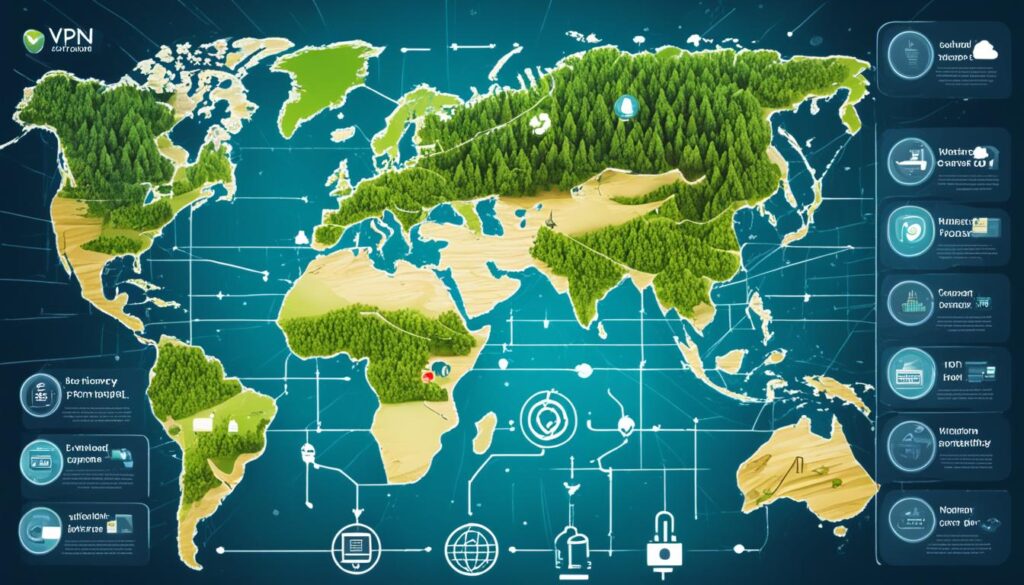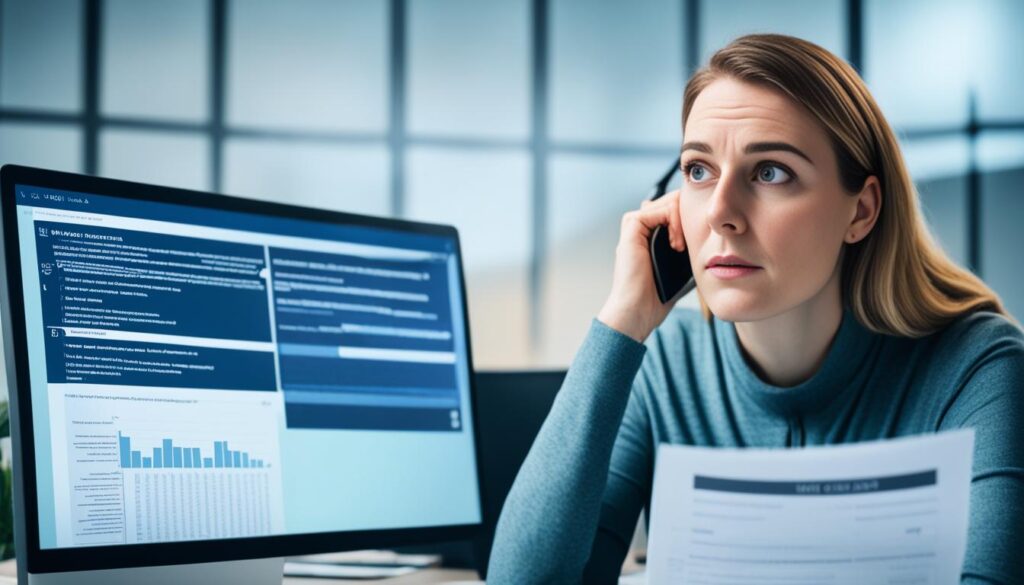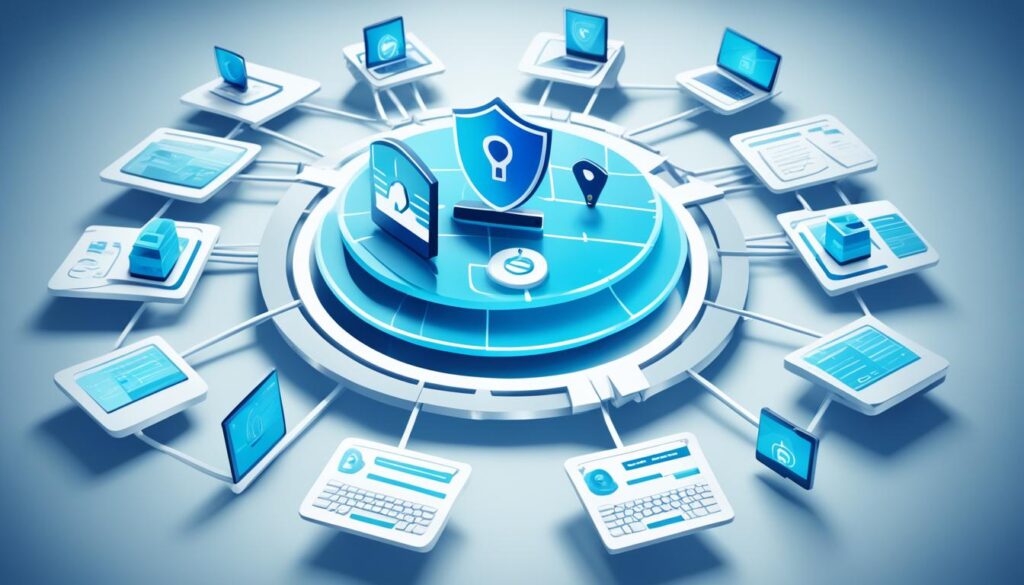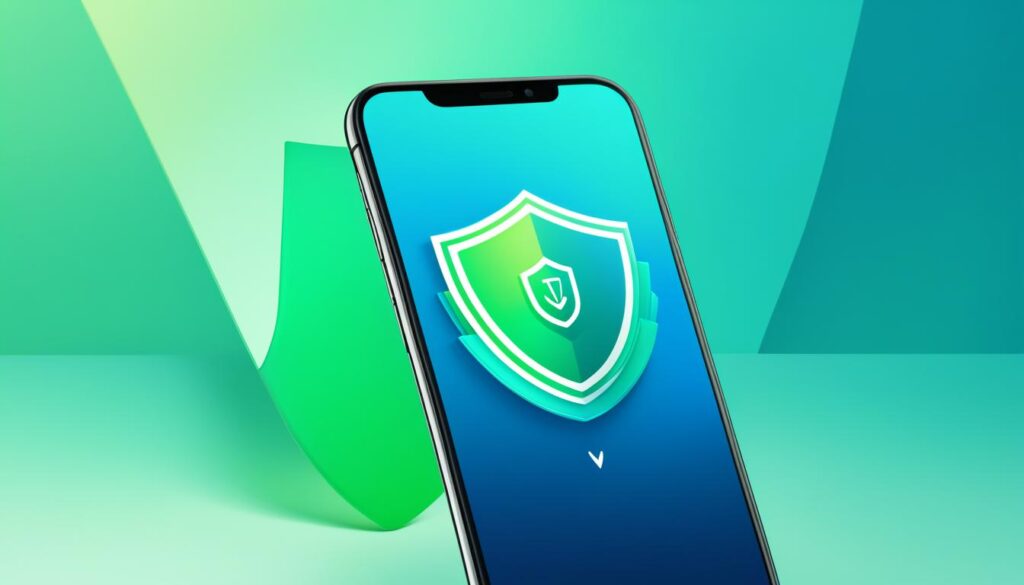Online privacy and security are always changing. VPN (Virtual Private Network) data logging is a key issue for web users. We use VPNs more to keep our internet privacy safe and to avoid geo-restrictions. It’s important to know what data VPNs might collect. This article explains this and the need for VPN companies to be clear and take responsibility.
Many think VPNs don’t keep logs, but that’s not always true. We’ll look at what kind of data VPNs might keep, like what sites you visit or when you connect. Knowing about this will help you protect your online security and privacy.
We’ll also talk about why VPNs log data. They might do it to manage user limits well or run their service better. This part stresses how VPNs need to be transparent with users. You should know what they collect and why.
Key Takeaways
- VPNs may collect various types of data, including usage metadata, browsing history, and connection logs.
- It’s important to know how a VPN manages your data for privacy and security.
- VPNs might keep some logs to keep their service running well and for user limits.
- Being open and responsible helps VPN companies earn trust.
- Before picking a VPN, checking their privacy and logging rules is very important.
The Myth of Zero-Log VPNs
Many think “zero-log” VPNs give total privacy and anonymity. The truth is different. Even with strict no-logging policies, VPNs can still face legal demands to share data. Some like PureVPN and IPVanish have been shown to log data when asked by law enforcement.
The Impossible Promise of Complete Privacy
A VPN saying it doesn’t log data might not really be true. VPN providers can be forced by law to keep data. They might also need to share it with the government. True online anonymity could be impossible, even with a VPN.
Unraveling the Marketing Claims
VPNs often use tricky marketing to claim they have “zero-log” policies. But, looking closely at their policies might show a different story. The language can be hard to understand or misleading. To know the truth, users must carefully read a VPN’s privacy policy and FAQs.
Types of Data Logged by VPNs
Let’s talk about the data VPN services keep. They can store lots of info, like what sites you visit and how you use the internet. This can impact how safe and private you are online.
Usage Metadata and Connection Logs
VPNs keep records of how you use their service, like your data use and when you connect. They also note where you connect from and the times. This information can be good for fixing issues or making the service better. But, it could also be used in not-so-good ways, like sharing your info with advertisers.
Browsing History and Online Activities
Some VPNs track what websites you visit and what your online activities are. They know URLs and DNS requests. A few VPNs, like Hide.me, don’t keep these records. This makes their service better for your privacy.
Aggregated and Anonymized Logs
Some think keeping data that doesn’t ID you, like without your IP address, is the best way. This makes your data safer while helping the VPN improve. It’s like a balance between service quality and your privacy.
Type of Data Logged |
Description |
Privacy Implications |
|---|---|---|
Usage Metadata |
Information like data usage, connection frequency, and device details |
Can be used for network optimization, but also potential for abuse and data sharing |
Connection Logs |
Details such as originating IP, VPN IP, and connection timestamps |
Necessary for some purposes, but could be exploited by authorities or third parties |
Browsing History |
Tracking of URLs visited and DNS requests made by users |
Highly sensitive information that can compromise user privacy if logged |
Aggregated and Anonymized Logs |
User metadata stripped of identifying information and anonymized |
Provides a balance between data utility and user privacy protection |
Why Do VPNs Log Data?
VPNs might log user data to check on subscription limits. This includes how many connections are active or the amount of data used. This check makes sure users follow the service’s rules to stop network abuse.
Enforcing Subscription Limits
VPN services set limits to keep their service running smoothly. They track user data to make sure these limits aren’t surpassed. This approach stops a few users from using all the network’s resources. It also ensures a good user experience for everyone.
Network Optimization and Troubleshooting
To improve their services, VPNs also log data. This is called “server-level logging.” Here, data is used to find and fix service issues. By looking at these logs, VPN teams can upgrade their network. This leads to a VPN that works better and is more reliable for users.
Verifying Logging Policies: Real-World Examples
As the VPN world grows, we see how some top providers handle user logs. These cases highlight why being clear and reliable matters in the VPN industry.
ExpressVPN’s Server Seizure Case
ExpressVPN faced a challenge when Turkish authorities took one of its servers in 2017. Despite this, the company showed just how seriously it took its no-logs policy. It proved it didn’t keep any user connection info, aligning with what it had promised its users.
This story is key. It shows the lengths ExpressVPN goes to protect its users’ privacy. Even when a government seized a server, they stood by their word.
Perfect Privacy’s Rotterdam Incident
Perfect Privacy faced a similar situation when servers in Rotterdam got seized. But they had set their servers to work in a special way. They used RAM disk mode, which doesn’t store data. This setup allowed them to prove their real no-logs commitment.
This event highlights how vital it is for VPN providers to be truthful about their privacy practices. It shows the real value of keeping no logs where users’ information is concerned.

Transparency and Accountability in VPN Logging
The VPN industry has a big issue with hiding the truth and not being accountable. They often say they don’t keep logs, but the truth can be far from it. This is because there are no hard rules or standards in the industry regarding what can be called “no logs.”
Misleading Advertising and False Claims
Some VPNs use tricky marketing to make you think you’re safe when you’re not. They use words like “no activity logs” or “no connection logs.” But this can mean they’re still collecting some of your information. So, you might not really know what they’re up to.
The Importance of Third-Party Audits
The VPN world needs outside experts to check if they’re actually keeping to their promises. There are firms like Cure53 and Deloitte that do these independent checks on VPNs. If a VPN has had such a review and shared the results, it’s a good sign for your privacy.
We, the users, can push for more openness in the VPN world. By doing so, we can pick services that really protect our privacy. This also puts pressure on the industry to step up its game in looking after how they handle our data.
VPN Security: Balancing Privacy and Functionality
I’m all for keeping your online life private. I know many look for a VPN that never logs anything, a zero-log VPN. Yet, a bit of logging is needed for the VPN to work well and get better. VPN services walk a tightrope between privacy and making sure you get what you need from them.
Minimal Logging for Service Improvement
Keeping basic logs like how much data you use or making the network run smoother can help a lot. These logs let VPN companies see and fix any problems, so the service stays dependable. By collecting just a little info, VPNs can fix things and make their service better for us.
Avoiding Excessive Data Collection
But, too much logging, like tracking what sites you visit or what you do online, is bad news. It can harm your privacy and security quite a bit, making the VPN not so useful. When picking a VPN, make sure they don’t go overboard with collecting data. Make sure they value your privacy more than they want unnecessary data.
Being smart about how much they log lets VPN providers offer a service that is both safe and useful. It’s all about the right balance. A good VPN should protect your privacy and allow you to surf freely online.
Evaluating a VPN’s Logging Practices
When you worry about your online privacy and security, knowing how a VPN keeps logs matters. Start by reading the VPN’s privacy policy and FAQ carefully. This shows what data they collect, how long they keep it, and if they share it.
Reviewing Privacy Policies and FAQs
Focus on what the privacy policy and FAQ say. They should explain clearly about logging data. If it’s not clear, it might mean they’re not open. Find out if they store stuff like connection details or what you browse online. Also, see if they tell you what they do with the data and for how long they keep it. Know who might get to see your data too.
Contacting Customer Support for Transparency
If the website doesn’t give enough info, talk to the support team. Ask them direct questions about what data they log. Find out how long they keep it and how they keep it safe. Talking to them can clear up what the VPN really does with your data.
Legal and Regulatory Considerations
As the VPN industry grows, coping with legal and regulatory rules is tough for all involved. A major issue is how government surveillance and data requests can make VPN companies log and share user info, going against what they promise.
Government Surveillance and Data Requests
Many countries have rules that let them ask VPNs for user info. This means VPNs might have to hand over data, even if they said they wouldn’t. It’s a problem for keeping user privacy safe.
Jurisdictional Challenges and Accountability
One big challenge is that VPNs are used internationally, but there’s no single regulation system for them. This lack of standard rules lets VPNs play with words like “logs” to sound better than they are, confusing users.
Knowing where your VPN provider is based and its legal duties is key to your online privacy. Diving into a VPN’s legal background can help you choose one that balances security and privacy well.

Conclusion
VPN data logging can be tricky, and the idea of “zero-log” VPNs might not be totally real. Some VPNs work hard to keep the data they collect to a minimum. But, with today’s internet and the laws, total privacy and anonymity can be hard to get.
But, there are steps we can take. We should check how VPNs log our data, look at their privacy policies, and pick those that have had their privacy practices checked by others. It’s about finding a VPN that’s both useful and safe, and knowing what to look for in the VPN world.
In my quest for online privacy and security, I will stay alert. I will keep questioning VPN claims and push for more clear and responsible practices in the industry. To protect our digital lives and privacy in today’s world, the key is to be well-informed and make careful choices.



